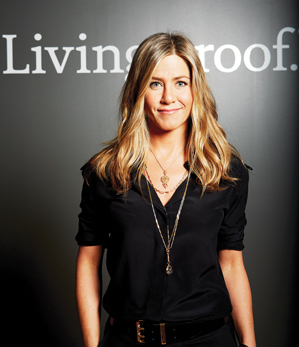The Science of a Perfect Hair Day
When most people think of Institute Professor Robert Langer, ScD ’74, they think of the novel methods he’s developed to deliver drugs that fight cancer, diabetes, and liver disease. But the much-decorated professor also happens to be behind a highly successful company that’s using science to combat the many causes of a bad hair day.

The company, Living Proof, recently celebrated 10 years in business. Now it sells its goods in 33 countries, and co-owner Jennifer Aniston is its celebrity spokesperson. Langer helped launch the startup from his laboratory, and the company continues to base its products on bioengineering.
“What’s been exciting to me about Living Proof is that we’ve been able to use really good science to solve challenges, and I hope that will be a good model for the whole industry,” Langer says.
The business began with a proprietary molecule. “We started in a biotech mode with a few researchers,” says Eric Spengler, Living Proof’s senior vice president of research and development. The scientists adopted Langer’s philosophy of studying the origin of a problem and came up with a solution to the bane of curly hair: frizz.
Living Proof formulated hair products that capitalize on the properties of octafluoropentyl methacrylate, or OFPMA, which repels both water and oil. “It lays down on the surface and changes how moisture moves in and out of the fiber,” Spengler explains. “That has a profound influence on the quality of hair. That’s the basis behind the majority of our business.”
Next, the researchers delved into MIT’s polymer and lipid library to work on a different problem: making fine hair feel fuller. They discovered poly beta-amino ester, or PBAE. “We have a lot of intellectual property around that,” Spengler says. PBAE deposits a flexible pattern of thickening dots that create space between hair strands. The flexible matrix is also durable, so styles last longer between shampoos.
Living Proof scientists work on getting the most out of the molecules. “We study rheology—the science of flow. We’re able to get very effective product coverage without it feeling heavy and greasy,” Spengler says.
The company has recently debuted several new products. No Frizz Humidity Shield blocks humidity the way sunscreens block out UV light, Spengler says. Another line, Perfect Hair Day, is nicknamed PhD, a playful reference to the company’s science-based strategy. Living Proof sells products through beauty retailers Sephora and Ulta, at select salons, and online.
Based on Binney Street, the company maintains its ties with MIT. Dan Anderson, who worked in the Langer Lab and is now an associate professor of chemical engineering, serves as its technical advisor, and chief science advisor Langer himself sits on the board of directors. Living Proof has been tapped for more than 80 honors, including two Edison Awards for Innovation in Consumer Products—one for each molecule.
While the struggle against frizz is real, Langer Lab researchers spend most of their time tackling major health-care challenges including cancer, diabetes, and paralysis. In July they published a paper in Nature Materials about super-long-acting pills.
“Instead of taking a pill every day, which older people or younger people or people with mental health issues sometimes forget to take, we have a pill that can last a week, or even a year,” Langer says. But he believes there is opportunity to improve life in lots of ways, including hair care: “I like to think everything can benefit from good science and engineering.”
Learn more about Professor Langer in “The Problem Solver,” May/June 2015
Keep Reading
Most Popular
Large language models can do jaw-dropping things. But nobody knows exactly why.
And that's a problem. Figuring it out is one of the biggest scientific puzzles of our time and a crucial step towards controlling more powerful future models.
The problem with plug-in hybrids? Their drivers.
Plug-in hybrids are often sold as a transition to EVs, but new data from Europe shows we’re still underestimating the emissions they produce.
Google DeepMind’s new generative model makes Super Mario–like games from scratch
Genie learns how to control games by watching hours and hours of video. It could help train next-gen robots too.
How scientists traced a mysterious covid case back to six toilets
When wastewater surveillance turns into a hunt for a single infected individual, the ethics get tricky.
Stay connected
Get the latest updates from
MIT Technology Review
Discover special offers, top stories, upcoming events, and more.